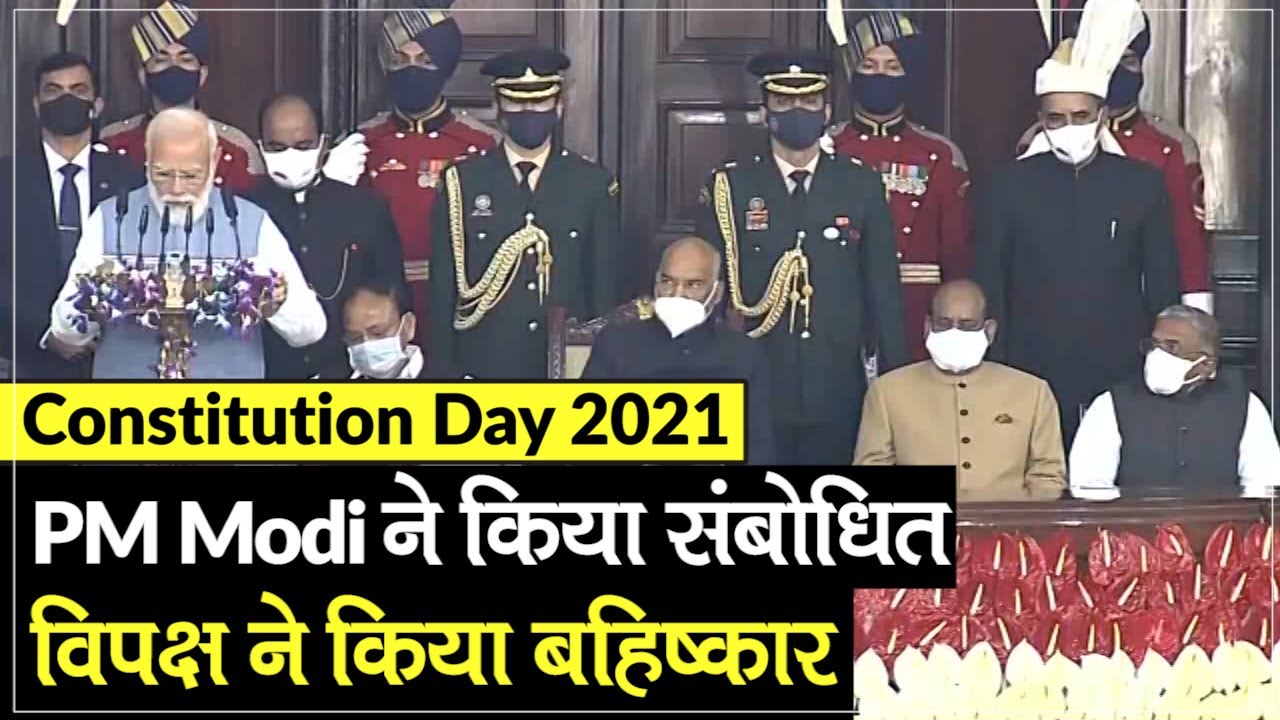


As India celebrates the 75th anniversary of its Constitution, the political scene is abuzz with discussions on its teachings and values. The Congress has requested two days in Parliament to discuss the document, while President Droupadi Murmu stressed its significance in a joint sitting. The Supreme Court also upheld the validity of ‘secular’ and ‘socialist’ in the Preamble, with Vice President Jagdeep Dhankhar emphasizing the need for constructive dialogue to uphold the sanctity of our democratic institutions and promote informed citizenship.
Celebrating the Importance of India's Constitution
India is marking the 75th anniversary of its Constitution, which was adopted on November 26, 1949, following two years of deliberations by the Constituent Assembly. The Constitution is a sacred document that defines the country's framework of government and the fundamental rights and duties of its citizens.
Political Discussion and Significance
As India celebrates this milestone, the importance of the Constitution and its teachings is being widely discussed in the political arena. The Congress party has requested two days in Parliament to debate the document, highlighting its enduring relevance. President Droupadi Murmu, addressing a joint sitting of Parliament, emphasized the Constitution's significance as the guarantor of India's sovereignty, unity, and integrity.
The Supreme Court played a crucial role in upholding the validity of the words "secular" and "socialist" in the Constitution's Preamble. These terms, the court stated, are essential to the foundational principles of the Indian state.
Vice President Jagdeep Dhankhar stressed the need for constructive dialogue to uphold the sanctity of democratic institutions and promote informed citizenship. He urged all stakeholders to engage in meaningful discussions to strengthen India's constitutional framework.
Background
The Indian Constituent Assembly was formed in 1946 following India's independence from British rule. It was tasked with drafting a constitution that would reflect the aspirations of the newly independent nation. The Assembly, which included prominent figures such as Dr. B.R. Ambedkar, spent two years debating and deliberating over the Constitution's clauses and provisions.
The Constitution was finally adopted on November 26, 1949, and it came into effect on January 26, 1950, marking the birth of the Republic of India.
Top 5 FAQs and Answers
1. What are the key features of the Indian Constitution?
The Indian Constitution is the world's longest, with 395 articles and 12 schedules. It establishes a parliamentary system of government with a bicameral legislature, a federal structure with a strong center, and an independent judiciary.
2. What is the significance of the Preamble to the Constitution?
The Preamble to the Constitution defines India as a sovereign, democratic, republic. It also proclaims India's commitment to social, economic, and political justice, as well as liberty, equality, and fraternity.
3. Who was the Chairman of the Constituent Assembly?
Dr. B.R. Ambedkar, also known as the "Father of the Indian Constitution," served as the Chairman of the Constituent Assembly and played a pivotal role in drafting the Constitution.
4. What are the fundamental rights guaranteed by the Constitution?
The Constitution guarantees a wide range of fundamental rights to Indian citizens, including the right to life, liberty, and equality; freedom of speech, expression, and assembly; and the right to property and religious freedom.
5. How has the Constitution been amended over time?
The Constitution has been amended 104 times since its adoption. These amendments have been made to address changing circumstances and to adapt the Constitution to evolving needs and aspirations.

In a dramatic turn of events, Congress leader Rahul Gandhi was stopped from accessing flood-hit villages on the India-Pakistan border due to safety concerns. A three-week-long investigation into allegations against Reliance Foundation's Vantara wildlife centre found no evidence of wrongdoing, prompting the Supreme Court to close the case. Forest officials in Madhya Pradesh are seeking answers from an IRS officer and his wife, who are accused of building a resort in an ecologically sensitive zone. Stay updated with these and other news stories on the Indian Express.

Rahul Gandhi, who was on a visit to flood-hit villages in Amritsar and Gurdaspur, was stopped by police from crossing the Ravi river to the "zero line" villages on the Indo-Pak border. The Congress leader had spent the day assessing damage and meeting with victims before being told it was unsafe to attempt the boat crossing. This comes after the Supreme Court closed a case involving allegations against the Reliance Foundation's wildlife rescue centre in Gujarat. Meanwhile, forest officials have sought clarification from an IRS officer and his wife for allegedly building a hotel/resort in an ecosensitive zone at Panna Tiger Reserve. Stay updated with breaking news on our live blog on Instagram.

Global leaders take to social media to send well wishes to Indian Prime Minister Narendra Modi on his birthday. With the upcoming national election and ongoing tensions with neighboring countries, world leaders hope for continued success and prosperity for both Modi and the nation. India's growing presence on the global stage is recognized and celebrated by leaders across the world, showing the significance and influence of the country's political landscape.

Today, September 17, marks the birthday of India’s Prime Minister and influential global leader, Narendra Modi. As he turns another year older, people from all over the world are sharing warm wishes, heartfelt messages, and inspiring quotes to honor his dedication and leadership to the nation. With a dominating presence on social media, PM Modi's birthday images are the perfect way to extend your wishes and celebrate his special day.

As Indian Prime Minister Narendra Modi celebrates his 75th birthday, world leaders, including former US President Donald Trump and Israeli Prime Minister Benjamin Netanyahu, sent messages of congratulations and appreciation. In their messages, they praised PM Modi for his leadership and his role in strengthening India's position on the global stage. In a phone call, President Trump and PM Modi also discussed important global issues and their commitment to further enhancing India-US relations.

On his 75th birthday, Prime Minister Narendra Modi received warm wishes and praise from President Droupadi Murmu and leaders across party lines. Murmu praised Modi for instilling a culture of achieving great goals in the country and wished for his ongoing good health and leadership. Other leaders, like Yogi Adityanath and Nitish Kumar, also thanked Modi for his contributions to India's progress and development. Delhi Chief Minister Rekha Gupta and her cabinet colleagues also participated in a blood donation camp organized as part of the BJP-led city government's 'Sewa Pakhwada' to commemorate the PM's birthday.

Union Parliamentary Affairs Minister Kiren Rijiju announced the government's plans to bring an impeachment motion against Allahabad High Court Judge Justice Yashwant Varma, who is embroiled in a corruption case and has been indicted by a Supreme Court-appointed committee. Rijiju emphasized the need for all political parties to work together in this endeavor, stating that corruption in the judiciary should not be viewed through a political lens. He has already reached out to major parties and plans to engage with smaller parties before the Monsoon session of Parliament begins on July 21.

The Supreme Court rejected a petition seeking restoration of a damaged Lord Vishnu idol in Khajuraho, stating that it falls under the jurisdiction of the Archaeological Survey of India (ASI). The petitioner claimed that the idol was damaged during Mughal invasions and that the refusal to restore it violated devotees’ fundamental right to worship. However, the Court pointed out that the issue falls under ASI's purview and suggested the petitioner to worship the Shiva linga at the temple instead.

As Prime Minister Narendra Modi celebrates his 75th birthday, world leaders, including US President Donald Trump and Russian Ambassador to India Denis Alipov, congratulate him for his leadership on global cooperation and sustainable development. PM Modi will also launch health and service-oriented campaigns in Madhya Pradesh today to empower women and children. Meanwhile, Defence Minister Rajnath Singh praises Modi for his vision, dedication, and efforts towards strengthening India.

On Engineers' Day, Prime Minister Narendra Modi honored the legacy of Bharat Ratna Sir M. Visvesvaraya, a pioneering figure in India's engineering history. In a message on this occasion, the Prime Minister expressed gratitude and admiration for Sir M. Visvesvaraya's groundbreaking contributions that laid the foundation for India's modern engineering landscape. He also applauded the current generation of engineers for their creativity and determination in continuing to drive innovation and tackle challenges, highlighting their crucial role in building a developed India.